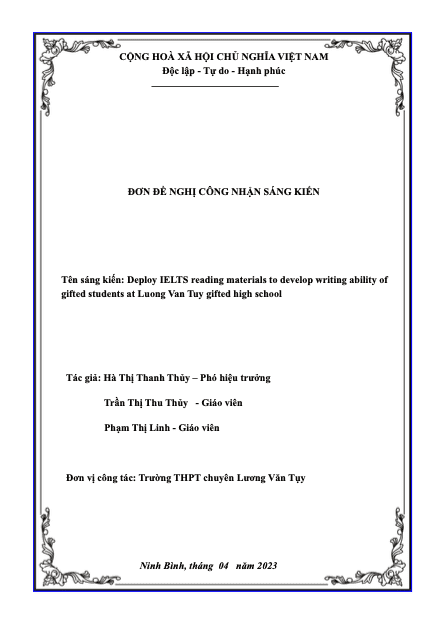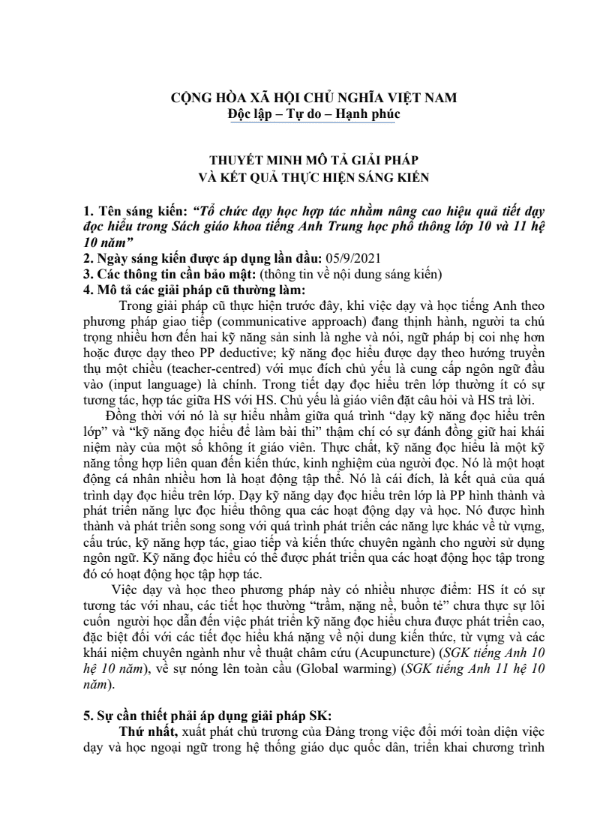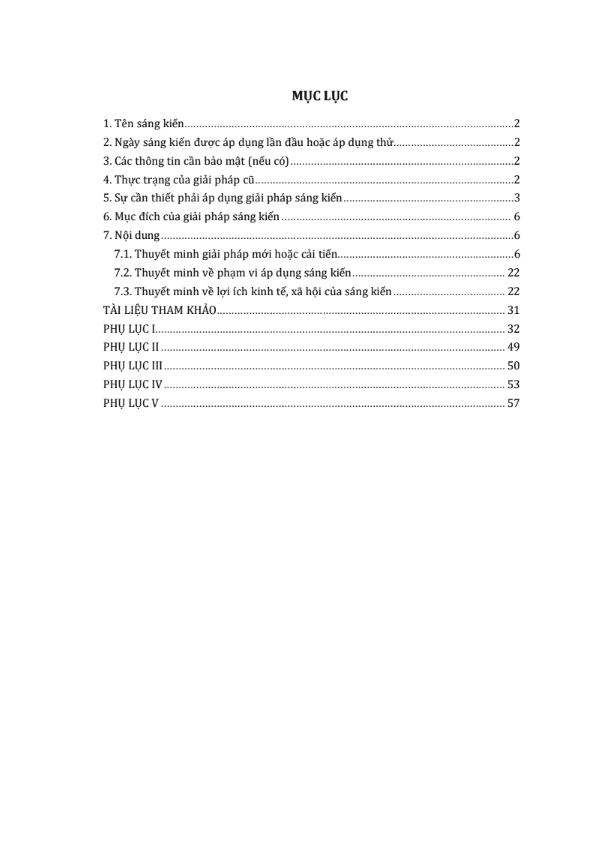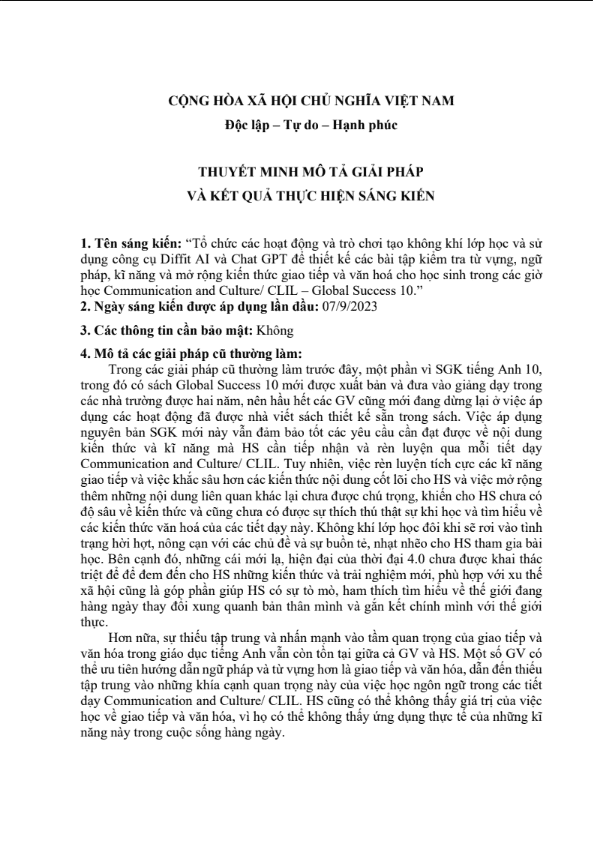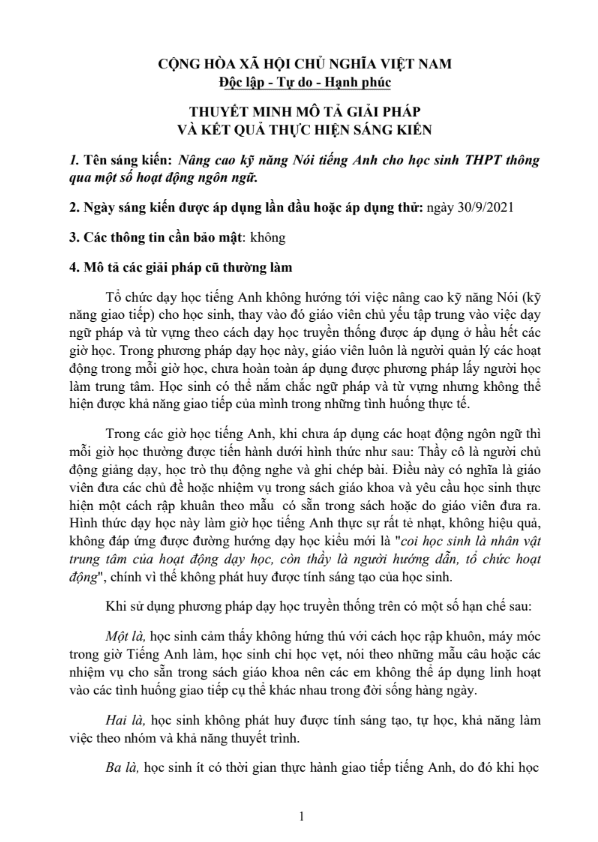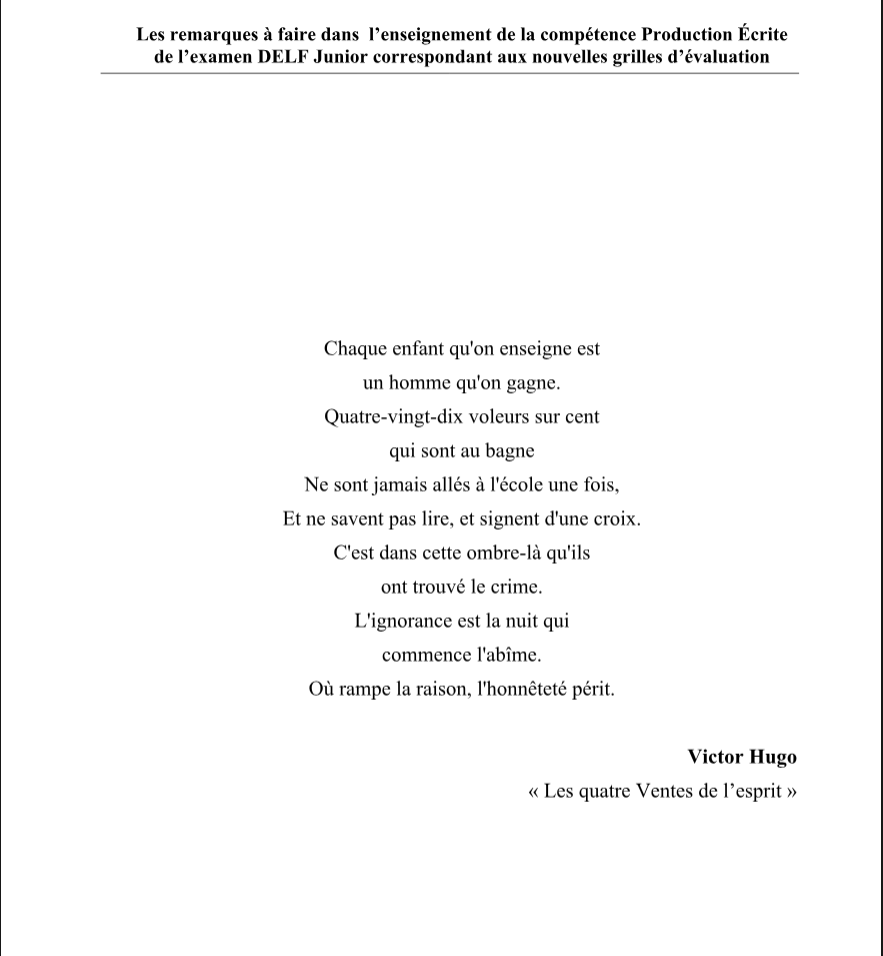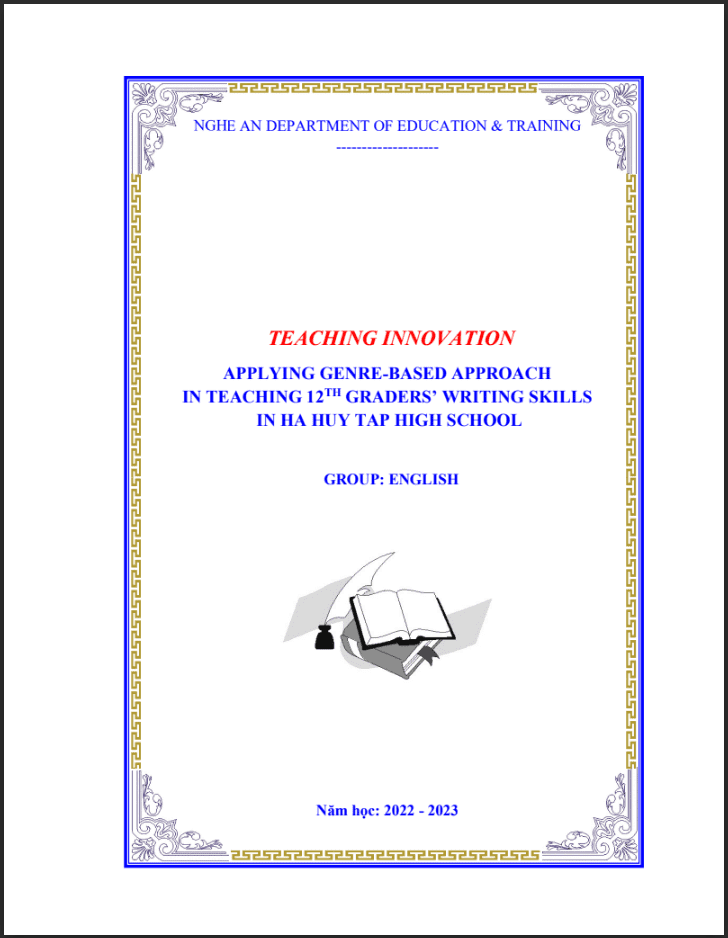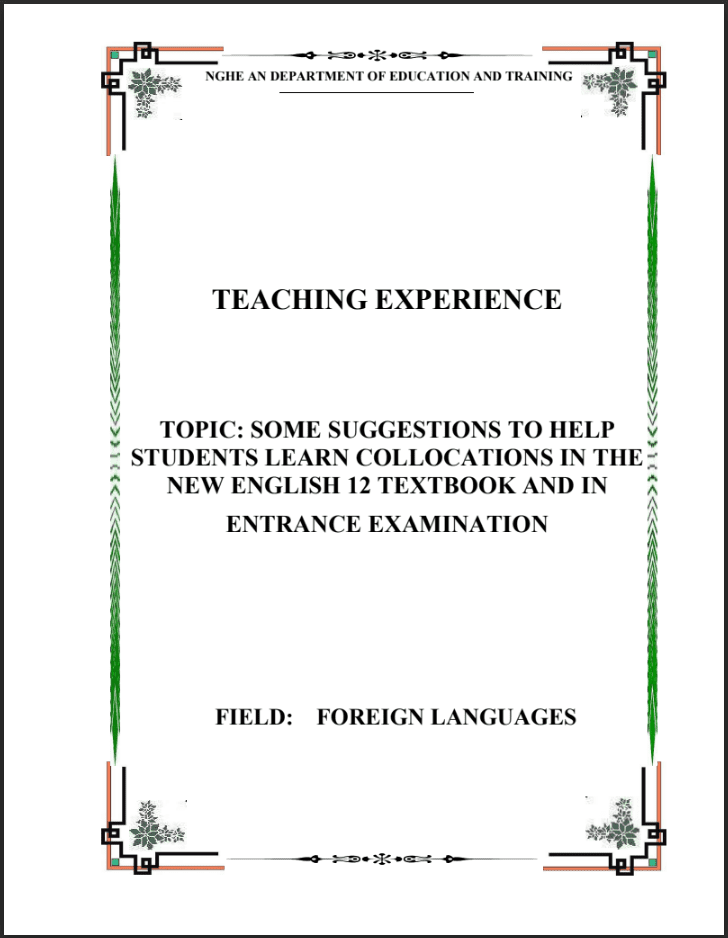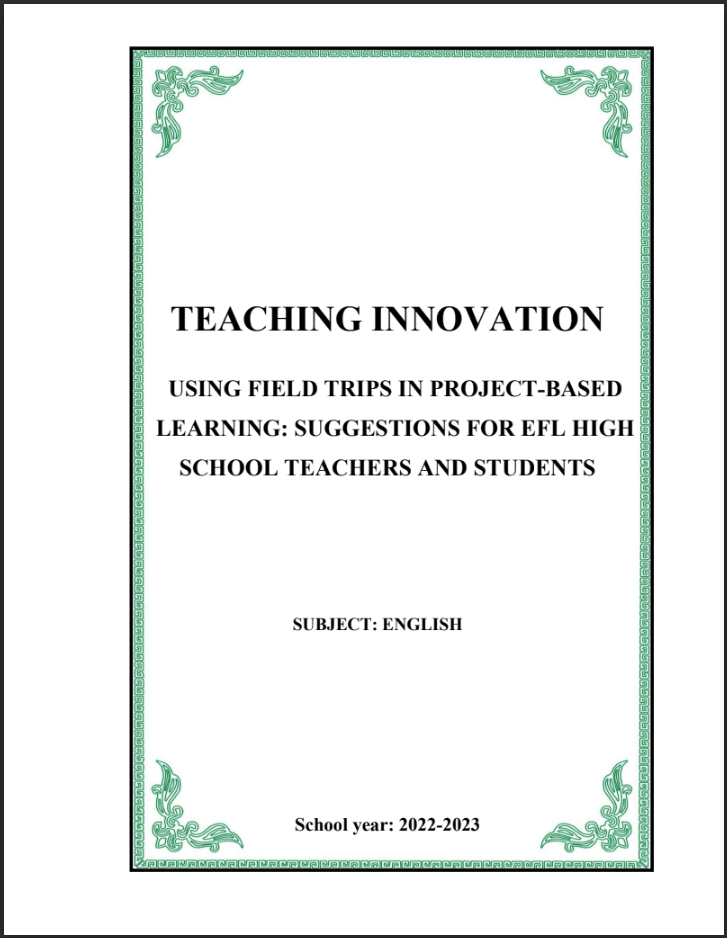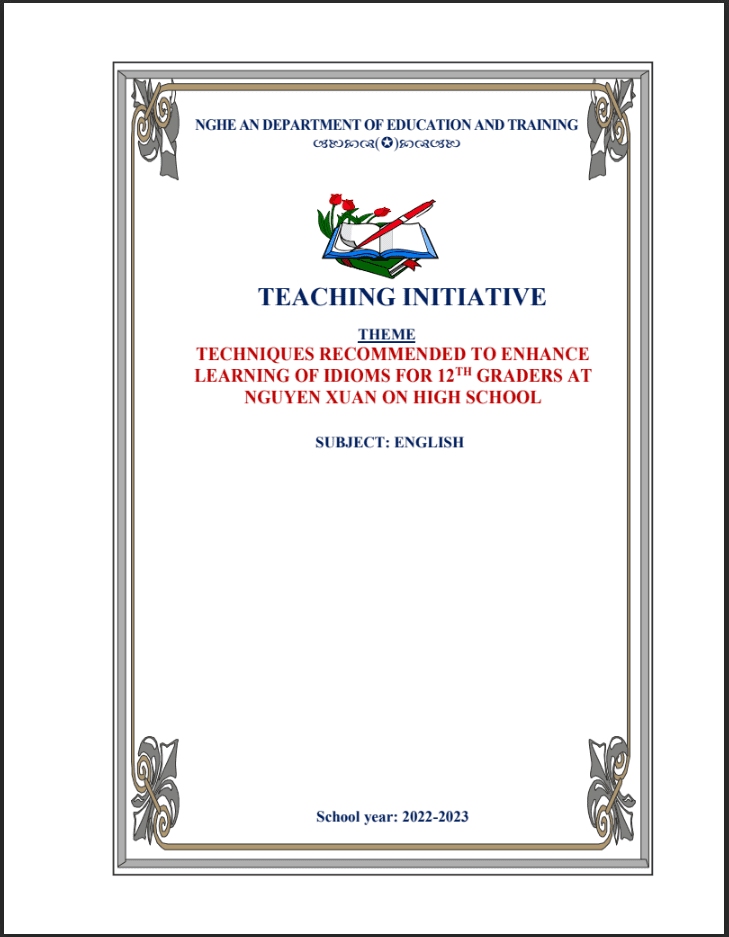SKKN Sử dụng tài liệu đọc IELTS để nâng cao khả năng viết cho học sinh chuyên tại trường THPT
- Mã tài liệu: MP1323 Copy
| Môn: | TIẾNG ANH |
| Lớp: | |
| Bộ sách: | |
| Lượt xem: | 564 |
| Lượt tải: | 2 |
| Số trang: | 39 |
| Tác giả: | Hà Thị Thanh Thủy |
| Trình độ chuyên môn: | Cử nhân đại học |
| Đơn vị công tác: | THPT chuyên Lương Văn Tụy |
| Năm viết: | 2022-2023 |
| Số trang: | 39 |
| Tác giả: | Hà Thị Thanh Thủy |
| Trình độ chuyên môn: | Cử nhân đại học |
| Đơn vị công tác: | THPT chuyên Lương Văn Tụy |
| Năm viết: | 2022-2023 |
Sáng kiến kinh nghiệm “Sử dụng tài liệu đọc IELTS để nâng cao khả năng viết cho học sinh chuyên tại trường THPT“triển khai gồm các biện pháp nổi bật sau:
3.2.2. Highlight academic vocabulary and ideas
Teacher and students work together to analyze IELTS reading text and identify academic vocabulary, background information and topic-related ideas. The examples below show how reading material will be utilized to assist students enhance their vocabulary, phrases, and ideas. New words are highlighted and explained the meaning in the right column while ideas and expressions are underlined
Mô tả sản phẩm
CHAPTER 1. INTRODUCTION
1.1. Rationale of the study
Writing is said to be a productive skill and according to Meyers (2005), writing is somewhat a talent, but it is primarily a skill and like any skill, it will be developed with practice. Ur (1996) argues that unlike speaking skills acquired intuitively, writing skills are in most cases taught and learned intentionally. However, writing is an intricate process that requires writers to convey their thoughts and ideas, and make them tangible and comprehensible. It is a challenging skill for nonnative speakers because writers must handle multiple concerns such as content, organization, purpose, vocabulary, punctuation, spelling, grammar accuracy, coherence and cohersion. In high school’s ELT setting, students are struggling to enhance their writing’s coherence since they did not know how to produce a logically organized and well-supported argument. ESL students’s writing ability could be tampered with by the overuse of the mother tongue and the limitation of academic vocabulary. From this real circumstance, the study is conducted with the aim to preparing students for their writing performance in the test in particular and help them improve their writing proficiency in general.
1.2. The aim of the study
The study was conducted with the aim of identifying the effectiveness of deploying IELTS reading materials to develop writing ability of gifted students, with the assumption that IELTS reading materials support students to build and develop academic vocabulary and writing style, thereby improving the ideas in students’ essay.
1.3. Scope of the study
This study was conducted with the participation of grade-10 students in Major English classes to investigate the influences of utilizing IELT reading passages on developing ideas of their writing pieces
1.4. The significance of the study
It is hopeful that the research could provide a more insightful understanding of the potential of this approach to learning and devise more appropriate techniques and strategies including guides for lesson planning implemented in classroom as well as proposals of ways to enhance students’ self-study. A collection of practice exercises and samples is also included so that teachers and students can utilize it as a source of teaching and learning materials.
CHAPTER 2. LITERATURE REVIEW
2.1. Definition of writing skill
The concept of writing has long been discussed and investigated by many researchers in order to find out how to improve this productive skill effectively. As a result, opinions are divided in answering such questions as what writing skills are and how to teach them.
Writing is a linguistic skill that is necessary for us to successfully express ourselves in our daily lives, especially in complex circumstances where logic is highly demanded, according to Pardede (2014, p. 57). Writing itself, according to Knapp and Watkins (2005, p. 82), is a disciplined activity that requires platforms for exchanging and assessing ideas like conversation or self-reflection. Sianturi, Silalahi and Purba (2020) also state that writing is the process of thinking and creating some ideas, mesages in sequences of orders. The sequences might just be two or three sentences long but the words have to be arranged and connected and make sense as a whole. In other words, they put emphasis in the significance of idea development, idea organization or coherence in general.
2.2. Challenges in Teaching Writing
2.2.1. Challenges to students
Lack of language knowledge: The main barrier to developing and practicing writing skills in students is their inadequate academic vocabulary. Students frequently experience difficulties coming up with words and ideas when studying a challenging subject like science, politics, technology …..which can render them anxious when brainstorming. In some cases, students fail to use vocabulary naturally in the right context. Many students invariably want to show that they are academically superior by employing academic vocabulary. Nevertheless, they sometimes minimize the significance of specific terminology for particular themes. They utilize complex terms without fully understanding the context, which leads to misunderstanding the idea of content to convey.
Lack of background knowledge is also an obstacle for students’ writing process. Nation (2006) draws the following conclusion: “Learners need to know roughly 98% of the terms in the written or spoken language to be able to grasp what they hear or read well.” In other words, a student’s ability to form ideas will not be hindered when exposed to novel or out-of-curriculum issues if they have a solid and comprehensive background, whereas students who lack background knowledge or who are unfamiliar with the subject would struggle.
2.1.2.2. Challenges to teachers.
As can be referred from the previous part, writing is truly complex and it requires a lot of effort to be enhanced. There arises the need of looking into common problems hindering the process of teaching writing skills.
According to Westwood (2008), writing is the most challenging skill to master since it needs the efficient cooperation of cognitive, linguistic, and psycho-motor processes. There are five components of effective writing namely purpose, audience clarity, coherence, and unity. Writing is therefore typically categorized as a complicated intellectual task.
Writing becomes such a unique skill because instructional context is usually restricted to classroom settings. Progress with this skill is difficult if the teacher attempts to teach how to write together with what to write (Alidmat & Ayassrah, 2017). Feronica, Apriani and Edy (2021) also figure out the challenges of teaching language proficiency to high school students who acquire English comprehensively with higher accuracy and efficiency targets.
CHAPTER 3: APPLICATION
After finding out the problems encountered by students when writing essay, it is pivotal that the solutions be discussed. The teachers decided to deploy IELTS reading materials to develop writing ability of gifted students.
3.1. The effects of the IELTS reading for writing approach on the writing ability of the learners
When it comes to the usage of specific phrases, authentic resources, especially “IELTS reading passages” are significantly more helpful than language provided in textbooks or any other educational materials. Because their primary audience is native speakers, they feature completely different topics, language, syntax, and other elements than traditional materials that have been adapted for second-language learners. Therefore, the integration between reading and writing will enable students understand and use English to a native level.
IELTS reading passages provides examples of truly exceptional writing, thereby offering pupils with training in voice, structure, syntax, and language.
Through IELTS reading texts, students also gain background knowledge in various academic fields, which might help them come up with ideas more effectively when writing essays.
3.2. Procedures
3.2.1. Select IELTS reading passages
– Reading passages will be chosen and categorized according to the topics listed below.
Health Environment/ Energy Sports Business
Politics Tourism/ Travel Education Science
Technology Work Food Fashion
3.2.2. Highlight academic vocabulary and ideas
Teacher and students work together to analyze IELTS reading text and identify academic vocabulary, background information and topic-related ideas. The examples below show how reading material will be utilized to assist students enhance their vocabulary, phrases, and ideas. New words are highlighted and explained the meaning in the right column while ideas and expressions are underlined
a. ENVIRONMENT
The climate changers
The romantic notion that early humans lived in harmony with their environment has taken quite a battering lately. Modem humans may have started eliminating other species right from the start; our ancestors stand accused of wiping out mega fauna – from giant flightless birds in Australia to mammoths in Asia and the ground sloth of North America – as they spread across the planet.
Even so, by around 6,000 years ago there were only about 12 million people on earth. That’s a far cry from today’s 6.6 billion, many of us guzzling fossil fuels, churning out greenhouse gases and messing with our
planet’s climate like there’s no tomorrow. So it may seem far-fetched to suggest that humans have been causing global warming ever since our ancestors started burning and cutting forests to make way for fields at least 7,000 years ago
Yet that’s the view of retired climate scientist William Ruddiman, formerly of the University of Virginia, Charlottesville. Ancient farmers were pumping climate-warming carbon dioxide and methane into the atmosphere long before recorded history began, he says. Far from causing catastrophe, however, early farmers halted the planet’s descent into another ice age and kept Earth warm and stable for thousands of years.
Could a few primitive farmers really have changed the climate of the entire globe? If you find this hard to believe, you’re not the only one. Ruddiman’s idea has been hugely
controversial ever since he proposed it in
2003. ‘Most new ideas, especially controversial ones, die out pretty fast. It doesn’t take science long to weed them out,’ he says. Yet five years on, his idea is still not dead. On the contrary, he says the latest evidence strengthens his case. ‘It has become clear that natural explanations for the rise in greenhouse gases over the past few thousand years are the ones that are not measuring up, and we can reject them,’he claims.
There is no doubt that the soaring levels of carbon dioxide and other greenhouse gases that we see in the atmosphere today – causing a 0.7° C rise in average global temperature during the 20thcentury – are the result of human activities. In the late 1990s, however, Ruddiman started to suspect that our contribution to the global greenhouse began to become significant long before the industrial age began. This was when an ice core drilled at the Vostok station in Antarctica revealed how atmospheric C02 and methane levels have changed over the past 400,000 years. Bubbles trapped in the ice provide a record of the ancient atmosphere during the past three interglacials.
What we see is a regular pattern of rises and falls with a period of about 100,000 years, coinciding with the coming and going of ice ages. There are good explanations for these cycles: periodic changes in the planet’s orbit and axis of rotation alter the amount of sunlight reaching the Earth. We are now in one of the relatively brief, warm interglacial periods that follow an ice age.
Within this larger pattern there are regular peaks in methane every 22,000 years that coincide with the times when the Earth’s orbit makes summers in the northern hemisphere warmest. This makes sense, because warm northern summers drive strong tropical monsoons in southern Asia that both encourage the growth of vegetation and cause flooding, during which vegetation rotting in oxygen-poor water will emit methane. Around the Arctic, hot summers thaw wetlands for longer, again promoting both vegetation
growth and methane emission.
In recent times, however, this regular pattern has changed. The last methane peak occurred around 11,000 years ago, at about 700 parts per billion (ppb), after which levels began to fall. But instead of continuing to fall to what Ruddiman says should have been a minimum of about 450 ppb today, the atmospheric methane began to climb again 5,000 years ago.
Working with climate modellers Stephen Verves and John Kutzbach, Ruddiman has shown that if the levels of these gases had continued to fall rather than rising when they did, ice sheets would now cover swathes of northern Canada and Siberia. The world would be heading into another ice age.
So why did both methane and C02 rise over the past few thousand years? In other words, why has this interglacial period been different from previous ones? Could humans be to blame?
Agriculture emerged around the eastern Mediterranean some 11,000 years ago, then shortly afterwards in China and several thousand years later in the Americas.
Farming can release greenhouse gases in various ways: clearing forests liberates lots of stored carbon as the wood rots or is burned, for instance, while flooded rice paddies release methane just as wetlands do.
To find out more about early farming, Ruddiman began to dig around in studies of agricultural history.These revealed that there was a sharp rise in rice cultivation in Asia around 5,000 years ago, with the practice spreading across China and south-east Asia. Here at least was a possible source for the unexpected methane rise.
Harmony /ˈhɑːməni /: the combination of simultaneously sounded musical notes to produce chords and chord progressions having a pleasing effect
synonyms:euphony, polyphony, consonance, tunefu lness…
eliminating/ ɪˈlɪmɪneɪtɪŋ /: completely remove or get rid of (something)
synonyms: remove, get rid of, abolish, put an end to, do away with, end,terminate, eradicate, destroy
accused/əˈkjuːzd /: charge (someone) with an offense or crime
synonyms:charge with, indict for, arraign for, take to court for, put on trial for…
fauna/ˈfɔːnə /: the animals of a particular region, habitat, or geological period
guzzling/ ˈgʌzlɪŋ /: eat or drink (something) greedily
churning/ ˈʧɜːnɪŋ /: to produce large amounts of something quickly, usually something oflow quality
far-fetched / ˈfɑːˈfɛʧt /: unlikely and unconvincing; implausible
pumping / ˈpʌmpɪŋ /: force (liquid, gas, etc.) to move by or as if by means of a pump
synonyms:force, drive, push, send, transport, raise, inject,…
catastrophe/ kəˈtæstrəfi /: an event causing great and often sudden damage or suffering
halted / ˈhɔːltɪd /: bring or come to an abrupt stop
synonyms:stop, come to a halt, come to a stop, come to a standstill, come to rest..
primitive / ˈprɪmɪtɪv /:
being the first or earliest of the kind or
in existence, especially in an early age of the world
synonyms:
prehistoric, primal, primary, original, aboriginal
weed / wiːd /: remove unwanted plants from (an area of ground or the plants cultivated in it)
suspect / ˈsʌspɛkt /: have an idea or impression of the existence, presence, or truth of (something) without certain proof
synonyms:have a suspicion, have a feeling, feel, be inclined to think, fancy…
drilled / drɪld /: produce (a hole) in something by or as if by boring with a drill
synonyms:bore a hole in, make a hole in, cut a hole in, drill a hole in, bore, pierce,puncture..
revealed / rɪˈviːld /: make (previously unknown or secret information) known to others
synonyms:divulge, disclose, tell, let out, let slip, report, declare, post, communicate..
interglacials /ɪntɝːˈɡleɪ.si.ɚ/ relating to a period of milder climate between two glacial periods
orbit / ˈɔːbɪt /: the curved path of a celestial object or spacecraft around a star, planet, or moon, especially a periodic elliptical revolution
synonyms:course, path, track, rotation, cycle, round
monsoons / mɒnˈsuːnz /: gió mùa ^^
thaw / θɔː /: become liquid or soft as a result of warming
synonyms:melt, unfreeze, soften, dissolve, defrost..
swathes / sweɪðz /: a piece or strip of material in which something is wrapped
liberates/ ˈlɪbəreɪts /: oscillate or seem to oscillate ( giải phóng, phóng thích )
cultivation/ ˌkʌltɪˈveɪʃən /: the action of cultivating land, or the state of being cultivated
synonyms:growing, raising, farming, planting
TÀI LIỆU LIÊN QUAN
- 7
- 105
- 1
- [product_views]
- 5
- 173
- 2
- [product_views]
- 4
- 165
- 3
- [product_views]
- 4
- 129
- 4
- [product_views]
100.000 ₫
- 6
- 434
- 5
- [product_views]
100.000 ₫
- 2
- 507
- 6
- [product_views]
100.000 ₫
- 9
- 546
- 7
- [product_views]
100.000 ₫
- 4
- 409
- 8
- [product_views]
100.000 ₫
- 2
- 595
- 9
- [product_views]
100.000 ₫
- 0
- 538
- 10
- [product_views]

